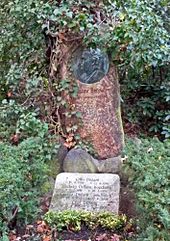Otto Didam
Otto Didam (born November 25, 1890 in Münster , † April 25, 1966 in Leipzig ) was a German choir director who had a major impact on the Leipzig choral scene in the first half of the 20th century and beyond.
Life
Otto Didam, son of a Münster merchant, came to Leipzig in 1910 to study at the Royal Conservatory of Music . His teachers here included Max Reger (theory and composition) and Otto Keller (piano). After completing his studies, he became a répétiteur at the Leipzig New Theater and later also Kapellmeister . Here he met his future wife, the singer Hedwig Borchers (1891–1976).
In 1919 he decided to devote himself to the workers singer movement. As early as 1861, a singing department of the Gewerblicher Bildungsverein was founded in Leipzig , which was followed in 1881 by a mixed choir. After the fall of the Socialist Law , numerous other choirs emerged, whereby the proletarian songs took a back seat in favor of vocal symphonic works. In March 1919 Didam took over the Leipzig men's and mixed choir , which was renamed the Leipziger Volkschor in autumn of the same year . In 1924 he was still director of the male choir Zentrum-Süd and in 1925 united both choirs to form the Didamsch Choirs working group , which the youth choir of the Socialist Workers' Youth also joined in the same year . In 1930 a children's choir was added so that it was possible to sing under Didam from an early age. The repertoire of the choirs was varied: madrigals , classical vocal symphonic works, folk and workers' songs as well as contemporary choral songs.
In 1930 the Didam choirs united around 600 singers and called themselves the Volkssingakademie Leipzig in contrast to the middle-class Leipzig Singakademie, which had existed since 1802 . In 1934 the Volkssingakademie was banned. Many singers switched to the Neue Leipziger Singakademie , founded in 1918 , which Otto Didam also took over as director in 1933. From 1954 the old name Leipziger Volkssingakademie was used again . In 1962, the now 72-year-old Otto Didam handed over the musical direction to his son Olaf Didam (1925–2009), who held it until 1990. Since 1991 the choir has been singing in a smaller cast as the Leipziger Volkssingakademie eV chamber choir
Otto Didam was buried in 1966 in the grave of his father-in-law, the singing teacher Gustav Borchers (1865–1913), in the Leipzig South Cemetery, where his wife, his son and his wife are also resting.
literature
- Horst Riedel: City Lexicon Leipzig from A to Z , PRO LEIPZIG. Leipzig 2005. ISBN 3-936508-03-8 , p. 109
- Katrin Löffler, Iris Schöpa, Heidrun Sprinz: The Leipziger Südfriedhof . Edition Leipzig, 2000, ISBN 3-361-00526-4 , p. 143
Web links
- Otto Didam in Leipzig biography
- Website of the Chamber Choir of the Leipziger Volkssingakademie eV
| personal data | |
|---|---|
| SURNAME | Didam, Otto |
| BRIEF DESCRIPTION | German choirmaster |
| DATE OF BIRTH | November 25, 1890 |
| PLACE OF BIRTH | Muenster |
| DATE OF DEATH | April 25, 1966 |
| Place of death | Leipzig |

